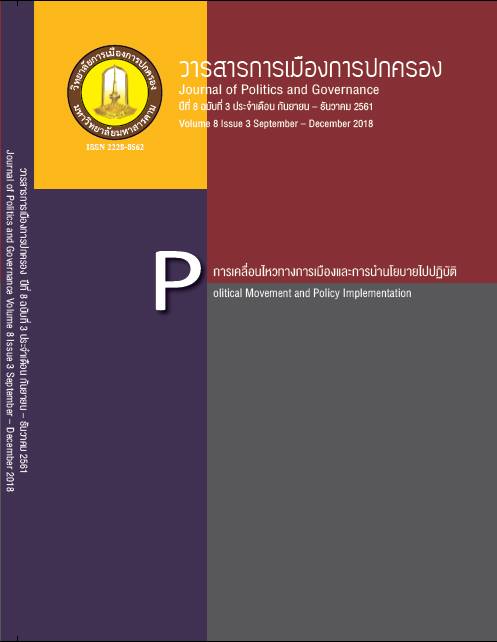Moral Discourse of Buddhism and Thai Politics: A Case Study of Buddha Isara’s Thought
Main Article Content
Abstract
This article aims to study: (1) a set of Buddhism’s moral discourse which was used to seize the power by coup d’état, (2) social conditions or contexts in practicing a set of aforementioned discourses in Thai politics, and (3) its consequences. Researching documents was conducted in order to study the roles of Buddha Isara, the core leader of the People’s Democratic Reform Committee (PDRC), such as Youtube videos, books, articles and relating researches. The results of the study are as follows: (1) There are six moral discourses of Buddhism which were used to claim the power through coup d’état: A) Thai style democracy discourse, B) good and moral man discourse, C) patriotism discourse, D) monarchy royalty discourse, E) corruption discourse, and F) otherness discourse. These discourses were used by Buddha Isara as a rationale for PDRC’s movement. (2) There are two social conditions or contexts in practicing these discourses in Thai politics: A) Society was shown to be immoral as the impure government and politicians committed scandalous corruption, B) society was convinced that the major institutes of Thailand were undermined by democracy. Buddha Isara argued that democracy was inconsistent with Thai origin and would eliminate or diminish the importance of Thai institutes. (3) The consequences of practicing the discourses: A) The discourses were used to monopolize the domination over morality and assert political rationale for PDRC’s movement, B) the discourses were applied to support the military intervention in the politics by staging a coup, C) the discourses were practiced in order to undermine democracy and patronize PDRC’s opponents, and D) the discourses were used to establish the new principle for the society
Article Details
References
ธนพล อิ๋วสกุล. (2557). บทบรรณาธิการ. นนทบุรี: สำนักพิมพ์ฟ้าเดียวกัน. ฉบับที่, 12.
ธนศักดิ์ สายจำปา. (2558). ระบอบทักษิณ:ในฐานะผู้ปลดปล่อยความปรารถนาของคนในสังคมไทย. นนทบุรี: สำนักพิมพ์ฟ้าเดียวกัน. ฉบับที่, 13.
ธรรมดีดี แล้วจะดี. (2556). ท่านจันทร์+หลวงปู่พุทธอิสระ ที่เวทีราชดำเนินนอก 8 พ ย 56. สืบค้นเมื่อ 13 มีนาคม 2561. จาก https://www.youtube.com/watch?v=ilweKYvobX0.
ประจักษ์ ก้องกีรติ. (2560). ธรรมาธรรมะสงคราม ความรุนแรงเชิงศีลธรรม และอนารยะขัดขืน: การเมืองอัตลักษณ์ของ “คนดี” ในวิกฤตการเมืองไทย (2556-2557). รายงานการวิจัย. มหาวิทยาลัยธรรมศาสตร์.
ประจักษ์ ก้องกีรติ. (2560). รัฐประหารในศตวรรษที่ 21 สัญญาไม่เป็นสัญญาและความด้อยพัฒนาทางการเมือง. สืบค้นเมื่อ 28 มีนาคม 2561. จาก www.the101.world/thoughts/coup-in-21st-century/.
พระไพศาล วิสาโล. (2552). พุทธธรรม ศีลธรรมกับประชาธิปไตย. นิตยสารวิภาษาสังคมศาสตร์ มนุษยศาสตร์และวัฒนธรรม, ฉบับที่ 3
ฟรังซัวส์ ฮูตาร์ท. (2524). ศาสนากับสังคมเอเชีย. กรุงเทพฯ: กองบรรณาธิการปาจารยสาร มูลนิธิเสถียรโกเศศนาคะประทีป.
มิเชล ฟูโกต์. (2558). ร่างกายใต้บงการ ปฐมบทแห่งอำนาจในวิถีสมัยใหม่. กรุงเทพฯ: มูลนิธิเพื่อการศึกษาประชาธิปไตยและการพัฒนา โครงการจัดพิมพ์คบไฟ.
วิจักขณ์ พานิช. (2558). รัฐ ธรรม นัว. กรุงเทพฯ: สำนักพิมพ์มติชน.
สมศักดิ์ เจียมธีรสกุล. (2550). ปัญญาชน 14 ตุลา พันธมิตรฯและแอ๊กติวิสต์ “2ไม่เอา” รัฐประหาร 19 กันยา รัฐประหารเพื่อระบอบประชาธิปไตยอันมีพระมหากษัตริย์ทรงเป็นประมุข. นนทบุรี: สำนักพิพม์ฟ้าเดียวกัน.
อิสระธรรม. (2016). นักวิชาการ ม.ธรรมศาสตร์ สัมภาษณ์หลวงปู่พุทธะอิสระ ณ วัดอ้อน้อย (ธรรมะอิสระ) จ. นครปฐม. สืบค้นเมื่อ 28 มีนาคม 2561. จาก https://www.youtube.com/watch?v=UFpgsQdeTDM.
อุเชนทร์ เชียงเสน. (2550). จารึกไว้ในยุคสมัยแห่งการ”รัฐประหาร. รัฐประหาร 19 กันยา รัฐประหารเพื่อระบอบประชาธิปไตยอันมีพระมหากษัตริย์ทรงเป็นประมุข. นนทบุรี: สำนักพิมพ์ฟ้าเดียวกัน.
BBC ไทย. (2560). สามปีรัฐประหาร สื่อต่างชาติมองไทยอย่างไรบ้าง. สืบค้นเมื่อ 31 มีนาคม 2561. จาก http://www.bbc.com/thai/international-%0A39996072%0A.
Buddha Isara. (2557). 09 มีนาคม 2557 หลวงปู่พุทธะอิสระ เวทีแจ้งวัฒนะ ช่วงค่ำ. สืบค้นเมื่อ 28 มีนาคม 2561. จาก https://www.youtube.com/watch?v=g5uNF1TE3eA.
MGR online VDO. (2557). หลวงปู่พุทธะอิสระนำมวลชน กปปส.แจ้งวัฒนะรณรงค์ล่ารายชื่อเสนอ กฎหมาย 3 ฉบับ. สืบค้นเมื่อ 13 มีนาคม 2561. จาก https://www.youtube.com/watch?v=aGvBUo3i1aQ.
WeLove Thai. (2556). หลวงปู่พุทธะอิสระ บนเวทีมวลมหาประชาชน ราชดำเนิน. สืบค้นเมื่อ 30 มีนาคม 2561. จาก https://www.youtube.com/watch?v=dXGhqty43AE.
Wikipedia. (2557). รัฐประหารในประเทศไทย พ.ศ. 2557. สืบค้นข้อมูลเมื่อ 28 มีนาคม 2561. จาก http:2//th.wikipedia.org/wiki/ไทย_พ.ศ.2557.


